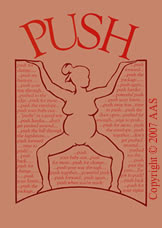 It just so happens I spoke at length yesterday with Sudy Storm, DEM, from Global Midwives in Ashland, Oregon. Check out this site, http://www.globalmidwives.org/
It just so happens I spoke at length yesterday with Sudy Storm, DEM, from Global Midwives in Ashland, Oregon. Check out this site, http://www.globalmidwives.org/news_job_openings.php (new site coming soon) to read about their five year program to train midwives in Sierra Leone.
I am so glad I had this conversation before reading about the UN plan to circumcise heterosexual men in sub-Sahara, Africa to prevent HIV. This is a group that needs our support. We can DO SOMETHING. We can support groups like Global Midwives with gifts of time, talent, or treasure. MONEY.
The clinic where this midwifery team is working is a four hour walk to the river, a boat ride across the river, and then IF there is a vehicle available it is a nineteen mile drive on rough roads to the nearest hospital. Hospital birth is not a possibility. Traditional Birth Attendants (TBA) are now being trained in midwifery skills to attend births in their community. Women WALK FOUR HOURS to attend prenatal and childbirth classes.
The group was there in December and is returning in June. Sudy's voice exuded love as she spoke of the women and she can't wait to get back there. She reminded me of a book I read about trusting in God's will for us -- the author said people are afraid to give their will over to God for fear they'll be sent to some remote place, but that God doesn't send us to Africa until God gives us the Love for Africans in our heart. Those of us for whom the travel is not our calling -- we can still be called to support those who do go.
The Global Midwives are working closely with the Ministry of Health to create sustainability. There are only 65 doctors in the country. Doctors and hospitals can not be the answer for them. Previous non-profits have come and built many hospitals but there are not supplies, stafff, or money for upkeep of buildings. Even in the US, doctors do not want to live in and practice in rural areas. It sickens me -- the disparity between our standard of living and those in third world countries. Rather than spending billions of dollars in Iraq or in 30%+ cesarean section rate here in the US, why are we not doing something to contribute to world poverty and to decreasing the maternal and infant mortality rates in these countries?
George Bush vetoed the legislation in 2006 (no money? or no will?) asking the US for help. the Child and Newborn Act (HR 4222) asked for a new funds and a comphrensive Us strategy for improving newborn, child, and maternal health. HA!! What a HOOT! The US leading the strategy to lower maternal and infant maternal loss? When other industrialized countries are better than the US. Maybe the US could give the money to LATVIA to develop the strategy. http://www.cnn.com/2006/HEALTH/parenting/
05/08/mothers.index/index.html. So, while the idea of the US leadership vetoing this is maddening, it is also heartening. The US answer would be to build surgerical suites with no ability or economy to support our way of birth. The Gates Foundation says we could save 700,000 lives by spending one billion dollars to make the improvements to lower maternal and infant mortality rates in ONE African country --- WITHOUT building ONE hospital. We know how to do it here and we know how to do it there.
The Save the Children report, which analyzed data from governments, research institutions and international agencies, found higher newborn death rates among U.S. minorities and disadvantaged groups. For African-Americans, the mortality rate is nearly double that of the United States as a whole, with 9.3 deaths per 1,000 births.
It's criminal negligence against women and children that the US continues upon this path of not resolving mortality rates for women here and around the world.
Sudy says that their project is meeting number four and five of the Child and Newborn Act. YOU GO, GIRLS..... what can you do to support them?
The Gates Foundation funded the SAVE THE CHILDREN to invest in improving maternal and infant mortality in the world based on the UN Millenium Development Goals:
For most children in the developing world, the most dangerous day of their lives is their birthday. (Amy Tuteur uses that line all the time to promote her agenda that midwives and homebirth is not safe. It is so arrogant to do so refering to American birth where the mortality rates are higher than industrialized nations where midwives are respected. For children in third world countries who have neither midwives or medical supplies and physicans, this is very true. It is because of nutrition, sanitation, and infection that women and babies die. It is selfish and ignorant for physicians in this country to undermine midwifery care and to ignore the plight of millions of women and babies while they manipulate (induce), drug, and chop the babies from American women. Where is the compassion for our own women and children? When obstetrics finds that perhaps then they can contribute to a more harmonious world. )
Of more than 10 million children under the age of 5 who die each year, about 1 in 5—an estimated 2 million babies—die within the first 24 hours of life, according to the seventh annual State of the World’s Mothers report issued today by Save the Children, a global independent humanitarian organisation. According to the report, an additional 1 million babies die during days 2 through 7. A total of 4 million babies die during the first month of life.
“The first hours, days and weeks of a baby’s life are critical. Yet, only a tiny minority of babies in poor countries receive proper heath care during this highly vulnerable period,” said Save the Children Australia CEO, Margaret Douglas, in issuing the report. “The most simple health measures taken for granted in Australia can mean the difference between life and death for these babies. Low-cost interventions such as immunising women against tetanus and providing a skilled attendant at birth could reduce newborn deaths by as much as 70 percent if provided universally.”
The report notes that most newborn deaths are the result of preventable or treatable causes such as infections, complications at birth and low birth weight.
“Newborn deaths are one of the world’s most neglected heath problems,” said Ms. Douglas. “While there has been significant progress in reducing deaths among children under age 5 over the past decade, we have made little progress in reducing mortality rates for babies during the first month of life. In fact, newborn deaths are so common in many parts of the developing world that parents put off naming their babies until they are a week to 3 months old.”
http://www.savethechildren.org
.au/australia/publications/mothers_report/mothers_report.html
More about Sierra Leone, Africa
http://www.globalissues.org/Geopolitics/Africa/SierraLeone.asp








2 comments:
Midwives on Missions of Service has returned several times to Sierra Leone to support community organizing and to provide training. We've updated the website, too: http://www.globalmidwives.org/sierraleone1.html
Midwives on Missions of Service has returned several times to Sierra Leone to support community organizing and to provide training. We've updated the website, too: http://www.globalmidwives.org/sierraleone1.html
Post a Comment